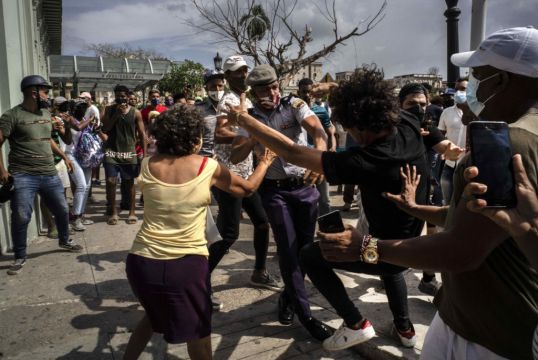Large numbers of Cuban police are patrolling Havana after rare protests around the island nation against food shortages and high prices amid the coronavirus crisis.
Many young people took part in the Sunday protests in the capital, which disrupted traffic until police moved in after several hours and broke up the march when a few protesters threw rocks.
Cuba is going through its worst economic crisis in decades, along with a resurgence of coronavirus cases, as it suffers the consequences of US sanctions imposed by former president Donald Trump’s administration.
The demonstrations in Havana and other communities around the tightly controlled country marked some of the biggest displays of anti-government sentiment in decades, and authorities appeared determined to put a stop to them.

Internet service was patchy, possibly indicating an effort to prevent protesters from communicating with each other.
“We’ve seen how the campaign against Cuba was growing on social media in the past few weeks,” President Miguel Diaz-Canel said on Monday in a nationally televised appearance in which his entire cabinet was also present.
“That’s the way it’s done: try to create inconformity, dissatisfaction by manipulating emotions and feelings.”
In a statement on Monday, US President Joe Biden said Cuban protesters were asserting their basic rights.
“We stand with the Cuban people and their clarion call for freedom and relief from the tragic grip of the pandemic and from the decades of repression and economic suffering to which they have been subjected by Cuba’s authoritarian regime,” Mr Biden said.
The US urges the Cuban government to serve their people “rather than enriching themselves”, he added.
The last major public demonstration of discontent over economic hardship took place nearly 30 years ago in 1994. Last year, there were small demonstrations by artists and other groups, but nothing as big or widespread as what erupted this past weekend.







